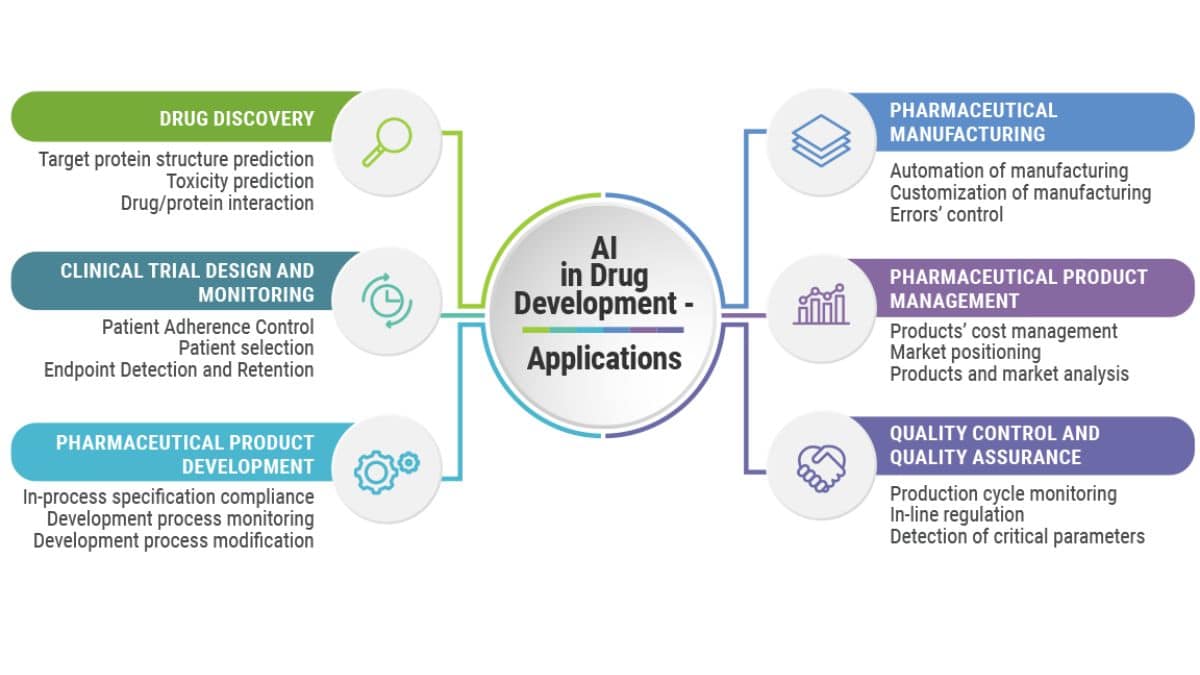 image credit:-aurigeneservices
image credit:-aurigeneservices
Google DeepMind’s latest unveiling of the AlphaFold AI model, AlphaFold 3, marks a significant leap in drug discovery. This iteration builds on past successes, demonstrating exceptional capabilities in predicting the structures of various molecules. Notably, AlphaFold 3 excels in forecasting ligand and nucleic acid structures, essential for drug development. Its accuracy in predicting post-translational modifications further enhances its utility in understanding cellular processes. These advancements have practical implications, facilitating the identification and design of therapeutic molecules, thereby expediting drug development processes. Isomorphic Labs, a DeepMind spin-off, is already leveraging AlphaFold 3 for drug design, showcasing its immediate impact on the industry.
AlphaFold 3 introduces a groundbreaking approach by eliminating the need for a reference protein structure in molecular docking, setting a new standard in predictive modeling. This innovation allows researchers to explore molecular interactions with unparalleled precision and accuracy. Despite its remarkable progress, AlphaFold 3 faces challenges in accurately predicting RNA structures. However, ongoing efforts aim to enhance the model’s capabilities in this area. Additionally, AlphaFold’s advanced sorting algorithms, powered by deep reinforcement learning, offer significant efficiency improvements, streamlining drug discovery processes.
The AlphaDev AI model, another innovation from DeepMind, enhances drug discovery by improving sorting algorithms for drug compounds. With its advanced sorting capabilities, AlphaDev accelerates the identification of promising drug candidates, contributing to the efficiency of drug development. While AlphaDev excels in specific computational tasks like sorting, its applicability to broader tasks such as bioinformatics and genomics may be limited. However, its unique approach and focus on efficiency make it a promising tool in drug discovery.
In comparison to other AI models, AlphaDev stands out for its specialized focus on sorting algorithms and potential to streamline drug compound analysis. Its efficiency improvements in sorting lists of items make it a valuable asset in drug discovery processes. Despite its advancements, AlphaDev has limitations, particularly in predicting protein function and RNA structures. However, ongoing research aims to address these challenges and enhance the model’s capabilities.
Relying solely on AI for drug discovery poses several risks, including biases in AI models, lack of rigorous testing for AI-designed drugs, and potential mistakes in complex biological systems. Integrating AI with traditional experimental methods is crucial to ensure comprehensive understanding and patient safety. Despite these challenges, AI has shown promise in discovering novel compounds for cancer treatment, designing inhibitors for specific proteins, and identifying potential drugs for combating COVID-19. As AI continues to evolve, its role in drug discovery is expected to expand, leading to further advancements in medical research and healthcare.
Artificial Intelligence (AI) is revolutionizing drug discovery, with notable examples including the identification of MEK protein inhibitors and the discovery of new cancer treatment compounds. AI algorithms analyze complex biological data to identify potential synergistic drug combinations, exploring interactions between drugs and their targets. This approach has the potential to significantly enhance the efficiency of drug discovery processes and lead to the development of more effective treatments. Additionally, AI is being used to optimize drug discovery processes, rapidly analyzing large datasets to identify compounds with the potential to target cancer cells. By accelerating research and offering new avenues for treatment development, AI is transforming the pharmaceutical industry and shaping the future of medicine.
The limitations of AI in drug discovery encompass challenges related to data quality, quantity, interpretability, standardization, and cost. One major challenge is ensuring the availability of high-quality data, as the data landscape often presents issues such as data scarcity, diversity, and varying quality, which can impede precise analysis and modeling by AI systems.Another significant hurdle is the cost and technical expertise required for integrating AI in drug discovery. This includes the substantial investments needed for infrastructure setup and maintenance, as well as recruiting proficient data scientists and AI experts, which can be a challenge for widespread adoption.
Interpretability and transparency are also key limitations, as the complexity of AI models can make it difficult to understand their decision-making processes. Building trust in AI models necessitates a comprehensive understanding of their underlying mechanisms, which is crucial for broader adoption in drug discovery.
The lack of standardization in data formats, collection methodologies, and analysis techniques in the drug discovery domain complicates effective comparison of studies and datasets. This lack of standardization poses challenges for AI in generating consistent and reliable predictions and models.
Addressing these limitations is essential to fully leverage the potential of AI in drug discovery. This includes efforts to improve data quality, enhance interpretability and transparency of AI models, establish standardization in the field, and manage costs effectively.
